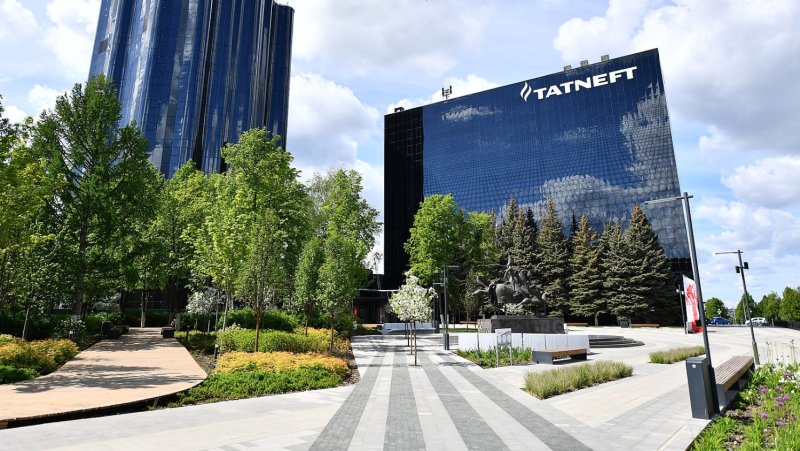
Company – On record
This profile is no longer actively maintained, with the information now possibly out of date
Company – On record
This profile is no longer actively maintained, with the information now possibly out of dateWhy this profile?
Tatneft operates the Romashkino oil field, identified as one of Russia’s “carbon bombs”. The company has been expanding in the Middle East and North Africa region, playing a vital role in accommodating the Kremlin’s geopolitical interests in that area. Furthermore, as one of the largest fossil fuel companies in Russia with a revenue of 17.4 billion USD, Tatneft contributes to the state’s economic capacity to wage war on Ukraine by means of taxes and the use of international arbitration.
What must happen
Commercial banks should avoid further financing Tatneft and should divest, as far as legally permitted, from any of the company’s projects they participate in. They should also cut any other commercial ties with it.
| Sectors | Oil and Gas Extraction |
| Headquarters |
|
| Ownership |
listed on London Stock Exchange & Moscow Exchange
Tatneft is a public company owned by Joint Stock Company Svyazinvestneftekhim, which is the nominal holding of the Central Depository of the Republic of Tatarstan joint stock company (29.07% voting ordinary shares). Citibank acts as a depository bank for the company’s American Depository Receipts program, holding 25.8% of the voting ordinary shares. Further information on Tatneft’s equity structure is available here. |
| Subsidiaries |
|
| Website | https://www.tatneft.ru/en |
Tatneft is the fifth largest oil producer in Russia and its crude output accounts for 80% of oil produced in the Tatarstan region. The company’s main activities include gas and oil production, oil refining, petrochemistry, management of gas station networks and production of equipment for the gas and oil industry.
Impact on human rights and communities
Contribution to the Russian state budget and war in Ukraine
Tatneft paid RUB 610 billion (EUR 8.1 billion) to the Russian government in taxes and other payments in 2021. As a result, Tatfeft contributes to Russia’s ability to finance the war and to perpetrate war crimes in Ukraine.
In addition, international arbitration is pending between Tatneft and Ukraine, in which the company has sought disclosure of documents that Ukraine claimed would undermine its national security as it would include information about the nature and extent of Ukraine’s military, defence and intelligence resources and expenditures. As of January 2023, the parties have agreed to maintain a moratorium on the legal “discovery” proceedings under which the documents are being sought.
Expanding presence in Iran
Iran is one of the Kremlin’s most steadfast supporters since the Russian invasion of Ukraine. In 2016, Tatneft signed a preliminary agreement with the National Iranian Oil Company (NIOC) to cooperate in the development of the Dehloran oilfield in western Iran. In 2022, NIOC expressed its readiness to involve Gazprom, Rosneft and Tatneft in the development of gas and oil fields in Iran.
Impact on climate
In 2017, Tatneft was listed as one of the 100 largest global greenhouse gas emitters. Tatneft owns the Romashkino oil field, which is considered to be a “carbon bomb”.
The World Benchmarking Alliance states that “Tatneft shows little evidence of any climate action or commitment for a low-carbon transition. The company discloses many intent and commitments but with little action or achievements to date”. The company has a target to reduce CO2 emissions by 10% by 2025 compared to 2016, which is insufficient to align with the aims of the Paris Agreement.
The company continues to increase oil and gas production. In addition to the expansion plans in Iran, Tatneft has resumed oil exploration in Libya's Ghadames Basin and announced plans to increase oil production in Turkmenistan. The expansion of oil production is incompatible with the goals of the Paris Agreement. For example, the IEA has stated that no investments in new oil and gas fields are needed in a 1.5°C pathway beyond those approved in 2021. The IPCC has also stated that fossil fuel reserves under production or planned for production already overshoot the 1.5°C carbon budget.
Impact on nature and environment
Tatneft is ranked 3rd among Russian companies in regards to the number of oil spills for which it is responsible (data for 2011, 2018). In 2019, the Russian Prosecutor’s Office undertook legal proceedings against Tatneft regarding oil spills. In one of the cases, the oil spill affected a nature reserve of regional significance, Chatyr-Tau, a specially protected natural area. Another spill affected an area of 641 square metres and a water body within a nature reserve of regional significance.
Tatneft finances its business activities through corporate loans and bond issuances. At the end of 2021, Tatneft debt portfolio comprised:
- 15 billion rubles exchange-traded bonds
- 29.2 billion USD corporate loans guaranteed by Export Credit Agencies
- 39.2 million Euro as subsidised loan
- Further 4.1 billion rubles other borrowings and loans.
During 2021, the company maintained close contacts with some of the largest international investors, including Goldman Sachs, JP Morgan and VTB Capital.
Further details on Tatneft’s financing are available on the tab below.
2023
2023-02-21 00:00:00 | EU Sanctions
Council Implementing Regulation (EU) 2022/878 of 3 June 2022 included Tatneft on the sanctions list for materially supporting actions which undermined or threatened the territorial integrity, sovereignty and independence of Ukraine.
